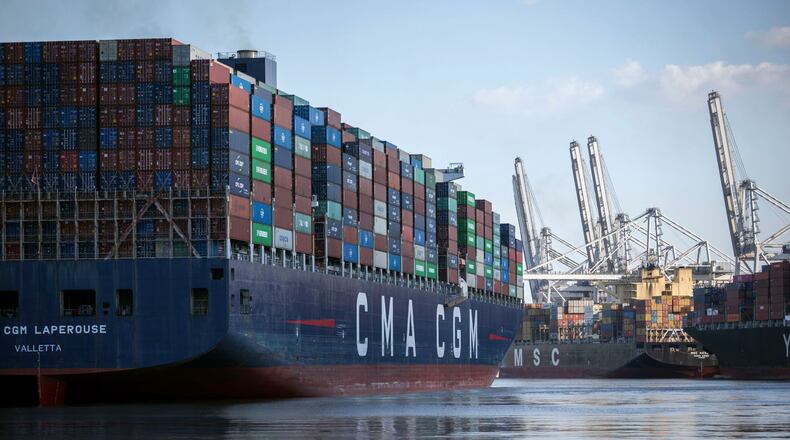The continued surge of trade through the state’s ports has meant a parallel increase in their impact on the Georgia economy, according to a report to be issued Tuesday.
The report, commissioned by the Georgia Ports Authority, concludes that the ports — Savannah and Brunswick — support 561,000 jobs across the state, according up from to an economic impact study by the University of Georgia’s Terry College of Business. That number is up from 496,700 jobs two years ago.
Some skeptics question the magnitude of the impact, but none say the ports are not crucial, providing transit points for imports and exports.
“I have been doing these studies for a couple of decades and every time it’s always a bigger number for the ports, and not just a bigger number, but a larger proportion of the economy,” said economist Jeff Humphreys, director of the UGA Selig Center for Growth, which conducted the analysis for the Georgia Ports Authority.
The ports’ impact in a year is $140 billion, 12% of the state’s economy, he said.
“The bottom line is that there’s one chance in 10 that you owe your job to the Georgia ports whether you realize it or not,” he said.
The Port of Brunswick is primarily a transit point for vehicles. The Port of Savannah handles containers loaded on and off huge ships that move through a recently deepened channel. In July, Savannah handled 530,800 20-foot equivalent container units, up 18% from the same month a year before.
The Port of Savannah is on track to move more than 6 million containers this year, more than last year’s record of 5.6 million, officials said.
The ports are crucial links in the supply chain that connects Georgia companies and consumers to the global economy.
Compared to the overall Georgia economy, the ports have a modest direct impact, including several thousand workers. But logistics companies and retailers also hire thousands of drivers and warehouse workers who move and store cargo. Moreover, recent years have seen a surge of construction in the Savannah area as retailers add massive warehouse and distribution centers near the port.
But most of the impact outlined in the UGA study — about $133 billion of it — comes from the added business done by companies that are either importing or exporting goods through the port. That includes only business that was done in Georgia that could not have been done without the availably of the ports, Humphreys said.
A number of economists question the accuracy of such economic impact studies, arguing that they provide what is desired by those who commission the studies. Sports events like the Super Bowl and baseball’s All-Star Game are often the center of such controversies about inflated estimates for their economic benefit.
Humphreys rejected a comparison with those arguments.
“This is different from a sports event,” he said. “This is dependable economic impact that takes place month after month and year after year. This is not a one-time injection of money.”
One critic, economist Rob Wassmer, the associate editor of Economic Development Quarterly, said what matters in assessing impact is the difference that the port makes — that is, how much more business and how many more jobs are in Georgia just because of the ports.
“This is a difficult thing to assess — how much would the economy shrink if you didn’t have the ports?”
Ports are crucial, but the UGA study overstates the case, he said. “They are making the assumption that if the ports were not there, the exports and imports would not be going in and out of Georgia.”
Much of the business in the state would still be done, albeit using other transit points, said Wassmer, a professor at California State University in Sacramento.
“These things would still exist in Georgia,” he said. “You could put them on rails and ship them out of somewhere else.”
Still, less convenient options would raise costs and add time to shipments.
The ports’ efficiency and proximity is one of the components in state development officials’ pitch to companies considering a move, said Joel Wooten, chair of the Georgia Ports Authority.
“For Georgia, in particular, they serve as powerful recruitment tools attracting industrial development and good-paying jobs for Georgians,” he said.
About the Author
Keep Reading
The Latest
Featured


